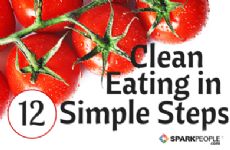Are you curious about the term clean eating? Have you ever wondered what it is exactly or whether it might benefit you?
In my experience as a "clean eater," this way of eating can be a fabulous way to improve your health.
Clean eating in the most simple terms means eating real food—foods that are whole (unprocessed) and in their most natural state. In other words, people who subscribe to clean eating try to avoid foods altered or processed by humans or manufacturers.
That being said, there are many different approaches to eating clean, and none of them are wrong. Everyone from carnivores to vegans can eat clean and it doesn’t have to be complicated. While some people put lots of strict dieting rules around their "clean" diets, that's not the case for everyone. Eating clean really can be delicious, fulfilling, filling and simple! Here's how.
What Exactly Is Clean Eating?
For the most part, clean eaters subscribe to these general guidelines:
- Eat plenty of vegetables, both raw and cooked.
- Eat unprocessed lean meats that have not had anything added. This includes fresh chicken and fish and even lean, humanely raised beef and game.
- Enjoy whole grains instead of the processed or refined variety.
- Eat smaller, more frequent meals about every 2 1/2 - 3 hours.
While some people put more restrictions on their "clean" diets (such as avoiding flour, sugar, dairy or other food groups at all costs), anyone can clean up his or her diet by focusing on the basic guidelines listed above. Some clean eating philosophies you may encounter include:
- The fundamental approach: These eaters follow the broader concept of clean eating by simply avoiding processed foods. They don’t worry about calories, macros, or meal frequency. They just eat real food, all the time.
- The diet approach: These folks usually follow a strict diet regimen and will typically eat 5-6 small meals per day. Usually, they are focused on a particular goal such as weight loss or even fitness competitions.
- The 4-hour approach: Some feel that eating every 2 1/2 - 3 hours is simply too much and they will take the diet approach, but with less frequency and slightly larger meals.
There is no right or wrong way to eat clean—just the right way for you to feel good and get your desired results.
How to Start Eating Clean
Not everyone can afford to dump the majority of food in his or her kitchen and start from scratch. So don't! Start your clean-eating adventure the easy way!
When you make your shopping list each week, select one or two items to switch with clean items. For example, if you need bread this week, make it a point to find "clean" bread (100% whole grain, no added sugar and identifiable ingredients such as whole wheat flour, salt and yeast). If you ran out of white rice, pick up a package of brown rice this week. It doesn’t have to be difficult to make the transition to clean foods—not does it have to happen 100% overnight! With this slow and steady approach, you don’t have to spend hours at the store reading labels either. Start small: You are also more likely to stick with it if you don’t shock yourself with a sudden change.
Clean Eating for Beginners
- Start slow and within your budget. Don't worry about drastic changes or being "perfect."
- Organic foods are popular among clean eaters, but if you can’t afford them, just do the best you can.
- Teach yourself to properly read labels. Focus on the ingredient list. Select foods with fewer ingredients—and ingredients that you recognize as real food.
- Understand that you will make mistakes. The important thing is not giving up.
- Don’t stress over minor things. Keep the bigger concepts in mind and always work to improve. It's about choosing the healthiest choice—not depriving yourself.
- If you do have something that doesn't mean your definition of "clean," don’t throw in the towel. Make your next meal clean. That’s the difference between a diet and a lifestyle change.
How to Eat Clean on a Tight Budget
Many people assume that clean eating is expensive. It can be, but it doesn’t have to be. Here are some tips for shopping clean on a budget:
- Look for in-store coupons. Coupons and sales flyers for your grocery store are more likely to highlight discounts on real food (like fruits, vegetables and unprocessed meats) rather than the coupons provided by food manufacturers, which only discount processed foods.
- Shop in bulk. Bulk items are often far more affordable than the packaged varieties. If your store offers bulk food bins, you also have the option to buy as little or as much as you want at a given time.
- Stock up on sales. When your store does have a sale on clean food staples such as meats or frozen vegetables, take advantage of that by stocking your freezer. It will save you money in the long run.
- Manage your food well. This is a big one. We throw away a ton of food in this country every day and it contributes to our food bills in a big way. Freeze cooked foods you know you won’t get to right away and don’t cook so much that you can’t eat it before it goes bad.
- Buy whole chickens. These go on sale regularly. Be sure you use the entire bird by making broth for soups with the portions you don't eat (bones, necks, backs, etc.). You can always freeze it if you can’t use it right away. Try these suggestions to get the most for your money out of a whole chicken.
|
|








.png)
.png)









.jpg)

